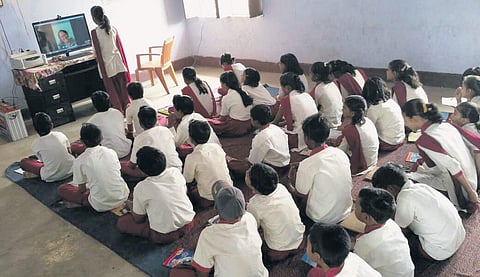

BENGALURU: There is a shortage of teachers to teach rural students in local language in the city.
Many IT professionals and teachers who volunteer to teach these children through digital classrooms also drop out due to job pressure, marriage or maternity.
E-vidyaloka, a Bengaluru-based not for profit organisation that works for education of rural children, is looking for 280 teachers to teach at 28 schools in Karnataka.
Currently, there are only about 127 teachers for 2,419 students in Karnataka for English, science and maths in the local language. Venkat Sriraman, founder of E-Vidyaloka, says, “When we started our services in Karnataka in 2014-15, there were about 40 teachers.
That number gets doubled every year, but we still need about 280 teachers.”
The main reason, he cites, is that there is isn’t enough awaressness about such an initiative. He adds, “We get calls sometimes asking if this initiative really exists, and many come to us saying that if they had known earlier, they could have started volunteering sooner.”
Over the last five years, the organisation has witnessed a drop out rate of about 25 per cent among the volunteers. “We have operational plans. They have to volunteer for minimum three weeks. Some complete two terms before leaving. We ask the volunteers to give us two to three weeks of notice so that we can arrange for a replacement,” says Venkat.
According to their research, he says, “Since 1992, 40 million have graudated, and even if 0.25 per cent of them come forward, one lakh students can be educated. We come to the same results, even if we look at the census figures. We believe there are many people who like to teach. There’s only a lack of awareness.”
The organisation tries to have two teachers per subject, but now, they are now falling short of about two or three teachers for each school. But there are also a few who join later for teaching again.
“A volunteer who works for an MNC rejoined this year after she took a break to relocate to the US,” he informs. Geetha Krishnamurthy teaches math to 7th grade students. A teacher for 35 years, she felt hesitant initially to teach the subject in Kannada. However, once the study material and syllabus were shared online, she became confident. “I like challenges. I learned how to relate to concepts and teach in Kannada.” She was teaching students in Mumbai before shifting to Bengaluru in 2015.
Rural children are better than most urban children. They are more receptive and enthusiastic,” she adds.
The students enjoy learning through digital platforms. Bharati Chikaki, a 7th grade student, says that she loves to learn this way. “The teachers show us interesting vidoes of animals.”
Internet connectivity is sometimes an issue, says another volunteer Gurudev, who teaches science to class six. He feels this cannot substitute classroom teaching, but in spite of these limitations, the platform is very useful for children. “I make students read out loud, conduct quizzes and invigilate during examinations. Since all the study material is published online, it becomes easier to teach. I show them videos and images to increase their interest in the subject.”
E-vidyaloka is now running a campaign called ‘Hallialli Paata, Bhavishyada Nota’ (Teach today, Transform tomorrow), to create awareness about rural education. Started in 2010, it has spread its operations to about seven states, including Tamil Nadu, Telangana, West Bengal and Karnataka.